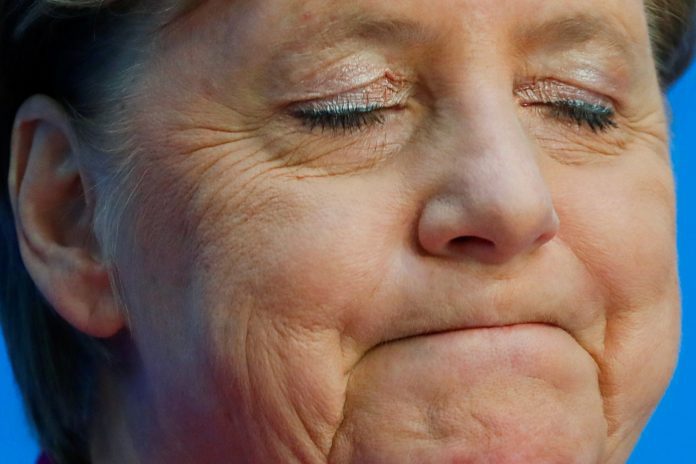
Angela Merkel announces her resignation following the catastrophic Hessen election. Firstly, she will resign as the leader of the Christian Democrats (CDU). In addition, she announced her resigning as Chancellor after the election scheduled in 2021 and that she will then withdraw from politics altogether.
At the time, Merkel can look back to 16 years as the undisputed leader of Germany, as well as the EU. Her former strong alliances, however, are breaking asunder in all areas. The primary reason for her wanting to resign is presumably that she wants to avoid an agonizing struggle over the leadership of the party.
At the Hessen election, the CDU declined by 11 percentage compared to 2013. Even worse off was the national co-operation partner, the Social democrats (SPD). They lost over one third of their electors and declined by 10,7 percentage. At the Bayern election earlier this year, the SPD’s support was bisected.
German politics is at the crossroads. Ever more people within the SPD wish to get out from the government coalition, bit the thought of a fresh election is frightening. The Norwegian newspaper Dagbladet calls it a choice between «a rock and a hard place».
The co-operation with Merkel and the CDU has been a catastrophe for the SDP and for the Free Democrats (FDP) alike. The latter was Merkel’s allies in 2009–2013. They ended up below the representative minimum and were excluded from the Bundestag.
Merkel’s alliances become ever weaker throughout Europe. Sweden has become an European joke and goes through a parliamentary crisis to which few seem to see any solution. Great Britain staggers along its way out from the EU. In France, an extremely unpopular Macron wanders dizzily about and does not stand forward as exactly equal to the task. In Italy and Austria, extremely immigration hostile forces reign, and especially Salvini has gone for the throats of Merkel, Macron, and the global forces. As he himself has declared, The party is over.
In the East, Merkel has almost no friends left. Migration has become the eternal question, making co-operation ever more difficult. Neither Hungary, Poland, Slovakia nor The Czech Republic is interested in taking «their share of responsibility» for the enormous amount of migrants. Quite correctly, they declare, We did not invite them here.
At the same time, the relation to the USA and Trump is nearly at the freezing point.
In addition, the German population smoulder. The party Alternative für Deutschland (AfD) in 2017 became the third largest party in the Bundestag election, with 12,6 % and 93 representatives. In Hessen, AfD got 13,1 % of the votes and for the very first time enters the local state parliament.
Most Germans do not want Germany to receive more Moslem migrants. Terrorist actions, murders, and a steep growth in rapes and other violent crimes frighten the citizens. Some politicians mention the possibility of a civil war, even though they do not dare talking about it in public. Massive, organized abuses of women in public spaces, for example in Cologne, were tried to be kept secret. Ever more people dismiss their hope for the future, and quite a few people buy properties in countries like Hungary, where there is no mass immigration.
Almost all focus will be directed towards her handling of the migrant crisis of 2015 when history is written about Merkel. Until then, her image was a firm, steady, solid and reliable one. She was maybe not loved, but most people respected her. In addition, she declared as early as in 2010,
– The multi-cultural society is utterly failed.
In 2015, this changed. When Merkel released the locks, cancelled Schengen and declared, «Wir schaffen das», she became for the first time extremely controversial. She became the pet of the globalists and an icon for immigration liberal forces throughout Europe. She was welcomed by activists carrying posters reading, «Refugees Welcome».
At the same time she was, however, hated by millions of Europeans who did not right away consider it a good idea to open the borders to massive floods of people from Africa and The Middle East. Merkel became the symbol of everything that was wrong with the EU. She herself decided to open the borders, without having any plan for the newcomers. Afterwards, she has tried with both threats and bribes to distribute the burdens on ever more reluctant EU countries.
The result was a complete German asylum chaos, counting hundreds of thousands of asylants of which one had no control. In addition it has proven to be almost impossible to return even those who clearly have no right to asylum, even not according to current liberal rules.
Without the migrant crisis, Brexit might never have occurred. Additionally, Merkel has by her political choices increased the right wind blowing across several European countries. Germany, as well as Europe, is more divided than ever after the fall of the Berlin Wall in 1989. For this, Merkel must assume her share of responsibility.
– In reality, Merkel broke her neck when she opened Germany and Europe to the wave of refugees arriving in 2015.
This is written by Dagbladet in an editorial, labelling the situation in Germany «shaking». The entire editorial is a good example of the strong support that Merkel has enjoyed in the mainstream media throughout Western Europe. She was the typical «gutenmensch». She was the hope shining in the darkness that hovered following Brexit and the election of Trump.
Even though Dagbladet and the rest of the mainstream media hold a wake nowadays, an ever increasing part of the population prefers a glass of Champagne. Merkel is the politician of the past and the events have outrun her solutions.
The migrant politics was founded on a set of lies and ended up being an ever increasing catastrophe to large parts of Western Europe.
Now, even Angela Merkel must pay; even if the price hardly matches the great detriment she has caused.
Translated to English by Lars Hoem

